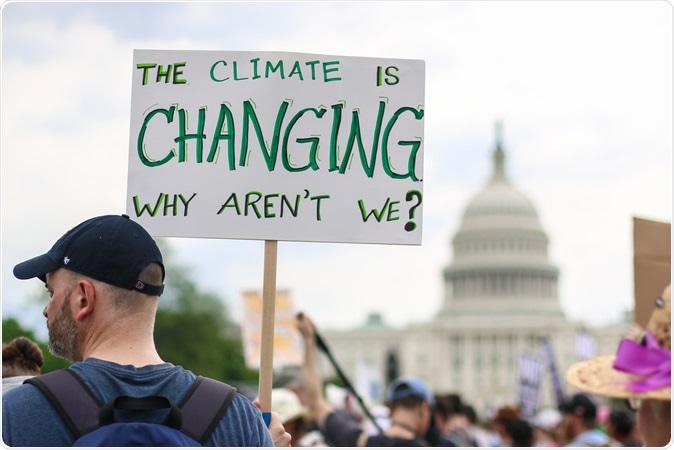Social learning matters in arresting climate change, just as much as geophysical factors like plant respiration or solar reflectivity of the earth’s surface, says a surprising new study. In a pioneering model of socio-climate interaction, researchers linked social dynamics to predicted climate changes themselves, to come up with better ways of preventing climate change mitigation.

Washington, DC - April 29, 2017: Thousands of people attend the People's Climate March to stand up against climate change. Image Credit: Nicole S Glass /Shutterstock
If the rate of social learning improves as required, says the study, climate change can be contained by over one degree Celsius. Conversely, if social norms nip climate-friendly action in the bud, humans will continue to act without regard to the reality of rapid global warming. This is not something new, of course, but the mathematics of the model proved its truth “clearly and unequivocally”, according to Professor Madhur Anand, study author.
For the first time ever, this mathematical model factors in social processes to predicted climate change. She builds her work on the well-known but neglected fact that human behavior not only determines carbon emission rates, but is influenced by it as well. Anand’s work over the last ten years on other human-environment systems, like forests and pest management, has thoroughly proved that human behavior is fundamental to bringing about change.
Social learning is defined as “the process whereby individuals learn new behaviors, values and opinions from other.” Social learning is strongly linked to social norms, which determine what types of behavior are accepted and practiced on a large scale. Social norms therefore influence human behavior very strongly.
If social norms favor climate mitigatory actions (directed at preventing or reducing global warming), more individuals will typically adopt such behavior. The opposite may occur with destructive social norms. Thus changing social norms is an important way to achieve climate-friendly action on a wide scale, though not in isolation.
While geophysical analyses and technological solutions abound, the current study focuses on the effects of coupling social learning with climate change. Sharing information about switching to low meat consumption or a greener vehicle, for example, changes social thinking over time, and influences climate change.
The rate at which social learning occurs is a crucial determinant of the utility of such behavior. With low rates of learning, only a few individuals will take mitigatory action despite climate changes that should provide an incentive to mitigatory action. Social norms are thus likely to be unhelpful initially.
Here, social learning is the first priority. The higher the rate of social learning, the faster the number of mitigators crosses the line at which it becomes useful, creating a positive feedback loop. This increases their number at an accelerating pace, causing a sharp rise. This will directly affect carbon emissions, say the researchers.
The Intergovernmental Panel on Climate Change (IPCC) called last year for action to stabilize climate change to 1.5 degrees Celsius higher than pre-industrial levels. The current study concludes that without accelerating social learning, the target is not achievable.
Co-author Thomas Bury commented says: “Our socio-climate model indicates that an increase in social media and other campaigns to raise awareness, such as climate marches and international reports, should ideally be followed by governmental and other incentives to reduce carbon emissions.”
The study thus identifies the promotion of widespread social learning, coupled with subsequent reduction in the costs of mitigatory action, as an optimal intervention for climate change. Social learning may occur in many ways, including public events and meetings, courses on climate change, and neighborhood interactions.
One recent instance is the way the IPCC report was given extensive space in the media, with discussions and editorials on the recommendations. This was immediately followed by climate marches, and then by a tax on high carbon emission fuels and rebates on low-emission fuels in all Canadian regions without emissions pricing plans.
The current study also highlights the need to consider the long-term impact of any initiative. Says Anand, “As a society, we need to get used to thinking 50 years into the future with climate change.”
The meat of this study is, in short, that human interactions really can bring about much-needed change faster and more radically, if exploited properly. As Anand sums up, “By looking at unique aspects of humans, maybe we can tap into these aspects to lead to the dramatic and widespread change that is urgently needed.”
The study was published in the journal PLoS Computational Biology.
Source:
Bury T. M. et al., (2019). Charting pathways to climate change mitigation in a coupled socio-climate model. PLoS Computational Biology. https://doi.org/10.1371/journal.pcbi.1007000